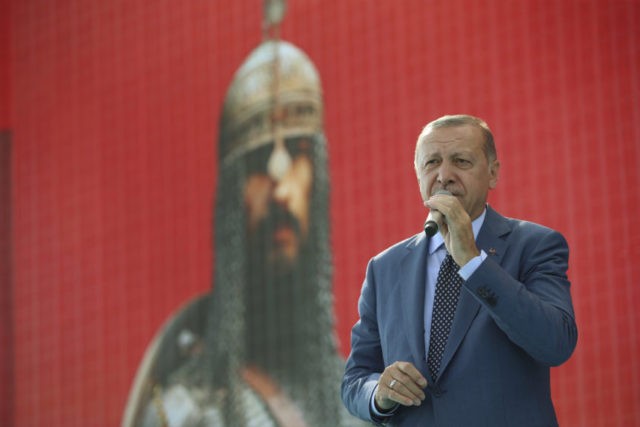Turkish President Recep Tayyip Erdoğan told an audience at a speech commemorating the defeat of the Byzantine empire on Sunday that, for those who take issue with him, “the issue is Islam,” and that Turkey under his leadership has a responsibility to protect Islam from Western influences.
Erdoğan told the audience that, should any divisions be clear among the Turkish people, “they will come onto us like hooded crows” and the Middle East will cease to exist. He did not specify who “they” was. He added that “being a Turk means being a Muslim,” dismissing the nationality of religious minorities.
The remarks follow a turbulent month for Turkish-American relations. President Donald Trump’s administration has ordered sanctions on the Turkish government in response to Ankara’s refusal to release American citizen and Christian pastor Andrew Brunson from imprisonment. Brunson was arrested for allegedly conspiring with the U.S.-based Islamic cleric Fethullah Gülen, a claim Brunson denies and Washington says Turkey has provided no evidence for. While Turkish officials finally ceded to move Brunson to house arrest for medical reasons, they have refused calls to let him return to his native North Carolina.
“Do not forget, Anatolia is a wall and if this wall collapses, there will no longer be a Middle East, Africa, Central Asia, Balkans or Caucasus,” Erdoğan told the audience on Sunday, using an ancient name for a territory that encompasses most of modern Turkey. “If we show even a small sign of weakness, you will see they will come onto us like hooded crows.”
Erdoğan went on to add that “some unwary people” believe that those who oppose his presidency do so because they dislike his hardline Islamist beliefs. “No, their issue is Turkey. The issue is Islam,” he insisted:
The issue is not the AKP [the ruling Justice and Development Party], it is Turkey; it is Islam, which they have symbolized in the name of our nation. Those who know the West, know being a Turk means being a Muslim. Turkey means all Muslims’ hope. We are the only country and nation who has direct contact with the West but is still able to protect its identity and freedom. This is why oppressed societies care so much about Turkey that they have a place for us in their hearts and prayers.
The president went on to warn that “they will not be able to divide us, break us up, and if we are ‘one,’ great and alive, with the help of Allah, we will walk toward [the goals of] 2023, 2053 and 2071 in very different ways.”
According to the remarks published by both the Turkish newspaper Hurriyet and the state-run Anadolu news agency, Erdoğan never defined who “they” are, though the context of conflict with the United States made it clear he appeared to be referencing the Christian West. In declaring that “being a Turk means being a Muslim,” Erdoğan did not add any reference the religious minorities that make their home in the country, mostly Christians and Jews.
Turkish Parliament Speaker Binali Yildirim also delivered remarks against “those who try to destroy Turkey’s unity,” according to Anadolu, at the event commemorating the defeat of the Byzantine empire at Battle of Malazgirt in 1071.
“In Turkey, economic coup attempts or coup attempts such as the one on July 15 carried out by traitors have never borne fruit, nor will they [in the future],” he asserted, expressing hope that the United States will negotiate an end to sanctions.
While Ankara has attempted to set a conciliary tone with Washington through its Foreign Minister Mevlüt Çavuşoğlu—who wrote in a USA Today editorial that both sides “should address our disagreements with diplomacy, rather than threats and provocation”—Erdoğan’s supporters have embraced his call to arms. The editor-in-chief of Yeni Safak, one of Turkey’s most belligerent pro-Erdoğan publications, reprinted an article on Monday published on last year’s anniversary of the same battle that echoes many of the themes in the president’s speech.
“But they wanted to remove us from Anatolia. They wanted to avenge the Byzantines. They wanted to avenge Manzikert. They wanted to exile us beyond the Caucasus, to wipe out a thousand-year-old history from memories. They pillaged almost the entire Islamic territory,” Ibrahim Karagül wrote, again without specifying here who he means by “they.” “We will know that multinational alliances, axes, the West’s protection, the political road maps formed by seeking refuge in the West … their political and economic projects will not benefit us, that the time has come to be rid of these.”
Instead, Karagül wrote, “We are going to return to … the Ottoman Empire.” To do so, “we have to eliminate the organizations that have become tools of intervention for the West during the last two centuries, and that tradition.”
Karagül once again claimed that “the U.S. is partnering with terrorist organizations to break Turkey.”
Karagül and hardline Turkish Islamists have become even more stridently anti-American since Washington announced sanctioned on high-level Turkish officials on August 1. In response to Brunson’s arrest, the U.S. Treasury sanctioned Minister of Justice Abdulhamit Gul and Minister of Interior Suleyman Soylu, then soon announced increased tariffs on some Turkish exports.
At the time, Erdoğan said, “An attack on our economy is no different from a direct strike against our flag and call to prayer.”
Turkey has since also increased tariffs on American rice, tobacco products, and alcohol, among other items.

COMMENTS
Please let us know if you're having issues with commenting.